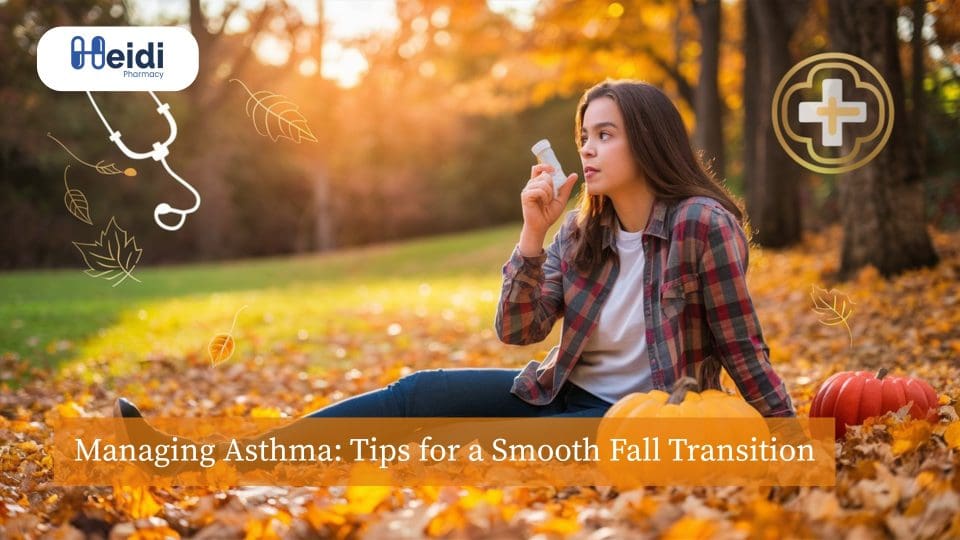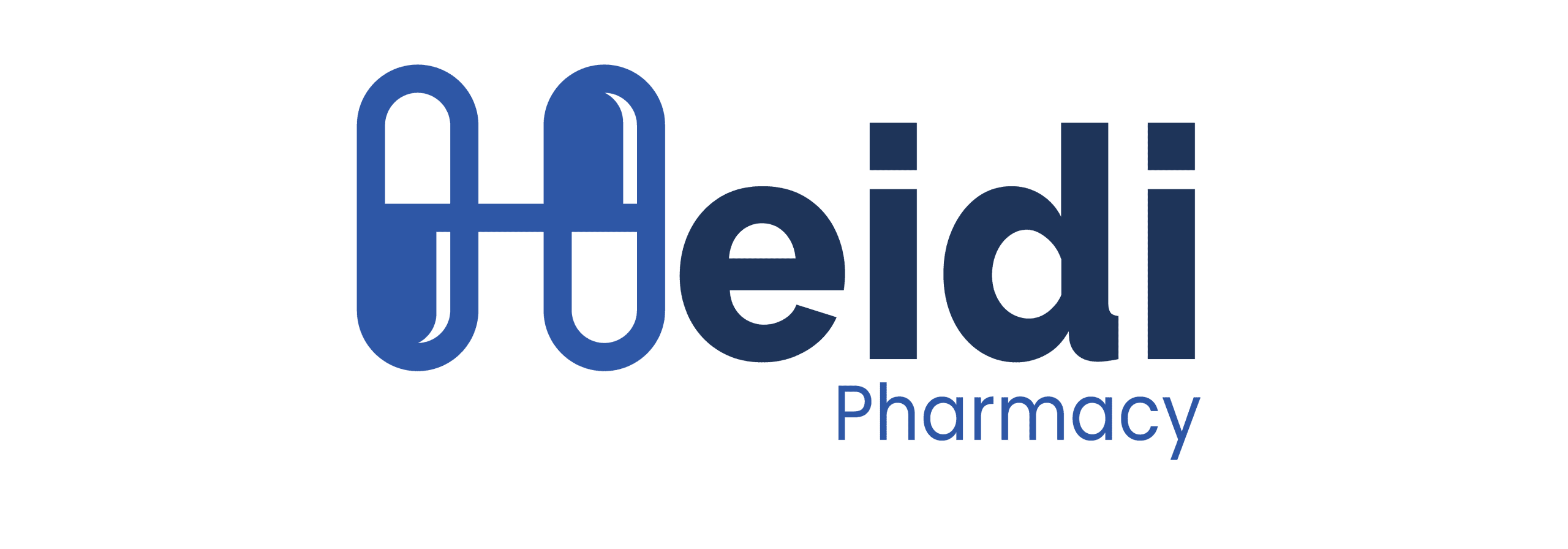
Asthma is a chronic respiratory condition that affects millions worldwide, making seasonal transitions especially challenging. Fall brings cooler temperatures, fluctuating air quality, and increased exposure to allergens such as mold spores and ragweed pollen—all of which can worsen asthma symptoms. For those dealing with allergic asthma or bronchial asthma, fall can mean more frequent flare-ups, reduced outdoor activity, and an overall decline in quality of life.
Fortunately, with the right management strategies, lifestyle adjustments, and medical support from local pharmacies such as Heidi Pharmacy New York NY, people with asthma can enjoy a smooth transition into fall without compromising their well-being.
Understanding Asthma and Its Seasonal Impact
What Is Asthma?
Asthma is a lung disease characterized by inflammation and narrowing of the airways, leading to difficulty in breathing. It often presents as wheezing, coughing, chest tightness, or shortness of breath. While asthma has no permanent cure, effective asthma therapy and treatment strategies can significantly improve quality of life.
Why Fall Triggers Asthma Flare-Ups
- Allergens: Fall pollen, mold, and dust mites can worsen allergies and asthma symptoms.
- Cool Air: Breathing in cold air can irritate inflamed airways.
- Seasonal Illnesses: Colds and flu can complicate treating asthma, making preventive care—like flu shots at a New York pharmacy—crucial.
- Lifestyle Changes: Reduced physical activity and increased indoor exposure to allergens also contribute to worsening symptoms.
Recognizing Asthma Symptoms in Fall
The severity of asthma symptoms varies from person to person. Some may experience mild discomfort, while others may have life-threatening attacks if left unmanaged.

Common Asthma Symptoms:
- Wheezing or whistling sound while breathing
- Shortness of breath, especially at night or early morning
- Persistent coughing (worse in cool or dry air)
- Chest tightness or pressure
Also Read: How to Read and Understand Your Prescription Labels Correctly
Allergic Asthma Symptoms
For those with allergic asthma, fall allergens intensify reactions:
- Sneezing, runny nose, watery eyes
- Itchy throat or skin rashes
- Worsening of bronchial constriction after allergen exposure
Knowing these warning signs allows timely intervention with allergic asthma treatment options prescribed by your doctor or filled through a prescription refill in New York NY.
Proven Strategies for Managing Asthma in Fall
1. Stay Ahead with Preventive Care
Preventing flare-ups is more effective than treating them. Regular medical check-ups, asthma therapy, and keeping your medications up to date are critical. If you live in New York, a pharmacy near me New York NY can help with easy access to medication delivery New York NY and seasonal vaccines.
2. Monitor Allergies and Asthma Together
Fall is peak season for allergies and asthma. Using HEPA air filters, cleaning your home frequently, and limiting outdoor exposure on high-pollen days can ease allergies and asthma symptoms.
3. Get Your Flu Shot Early
Viral infections, including influenza, can aggravate both lung disease and heart disease. Local options like flu shots New York pharmacy services at Heidi Pharmacy can protect vulnerable patients from severe complications.
4. Follow Prescribed Asthma Therapy
Your doctor may recommend long-term control medications, quick-relief inhalers, or biologics depending on the severity of your asthma. Always follow your prescribed allergic asthma treatment or bronchial asthma management plan.
5. Keep a Symptom Diary
Track triggers, weather changes, activity levels, and foods that worsen asthma symptoms. This simple tool can guide you and your doctor in adjusting medications.
6. Don’t Ignore Heart Health
Many asthma patients also have coexisting heart disease. Both conditions can affect breathing, so staying active, eating a heart-healthy diet, and seeking medical advice regularly is vital.
Also Read: Managing Seasonal Affective Disorder: What You Can Do
Regional Considerations for Asthma Management
Asthma care varies across regions due to differences in weather, healthcare systems, and allergens.
- United States (New York): Pharmacies like Heidi Pharmacy New York NY provide essential support through prescription refills, flu shots, and medication delivery in New York NY, making fall asthma management easier.
- United Kingdom: Fall dampness increases mold exposure, so many patients use dehumidifiers and NHS-supported asthma programs.
- India: Post-monsoon pollution spikes contribute to worsening asthma symptoms, highlighting the importance of wearing masks outdoors.
- Australia: Spring-fall overlap brings high pollen counts, making allergic asthma treatment crucial during seasonal shifts.
By understanding local triggers and resources, asthma patients can better adapt to seasonal challenges.

Lifestyle Tips for Easier Fall Transitions
- Stay Active Safely: Indoor workouts like yoga or cycling are excellent for lung health.
- Eat Anti-Inflammatory Foods: Omega-3-rich fish, leafy greens, and vitamin D sources help reduce airway inflammation.
- Practice Breathing Exercises: Techniques like pursed-lip breathing strengthen lung capacity.
- Plan Outdoor Activities Wisely: Check air quality apps before heading outside.
- Keep Medications Accessible: Always carry your inhaler, especially during outdoor activities.
FAQs on Managing Asthma in Fall
1. What are the main asthma triggers in fall?
Common triggers include pollen, mold, dust mites, viral infections, and exposure to cool air.
2. Can allergies worsen asthma symptoms?
Yes. Allergies and asthma often go hand in hand, with allergens like pollen and dust making airways more reactive.
3. How do I know if my asthma is worsening?
Increased coughing, wheezing, nighttime breathing difficulty, or needing quick-relief inhalers more often are warning signs.
4. Is it necessary to get a flu shot if I have asthma?
Yes. People with asthma are at higher risk of flu complications, making flu shots from a New York pharmacy highly recommended.
5. Where can I get asthma medications in New York?
Local pharmacies such as Heidi Pharmacy New York NY provide prescription refills, flu shots, and medication delivery New York NY services for asthma patients.
Conclusion
Managing asthma during the fall requires a proactive approach—recognizing symptoms early, avoiding triggers, staying updated on flu protection, and following prescribed asthma therapy. Whether you are dealing with allergic asthma symptoms or chronic bronchial asthma, taking preventive steps and seeking timely medical care ensures you can enjoy the beauty of fall without fear of flare-ups.
Pharmacies like Heidi Pharmacy New York NY play a vital role in supporting patients with prescription refills New York NY, seasonal flu shots New York pharmacy, and even convenient medication delivery New York NY—making it easier than ever to manage your asthma effectively.
Disclaimer
This blog is for educational purposes only and should not replace professional medical advice. Always consult your healthcare provider or pharmacist before making changes to your asthma therapy or treatment plan.

